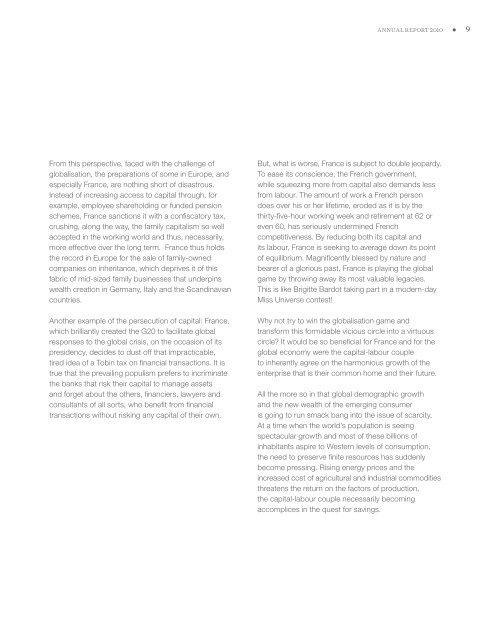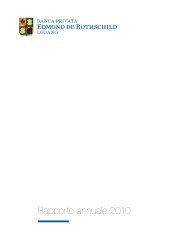Annual report 2010 - Banca Privata Edmond de Rothschild Lugano ...
Annual report 2010 - Banca Privata Edmond de Rothschild Lugano ...
Annual report 2010 - Banca Privata Edmond de Rothschild Lugano ...
You also want an ePaper? Increase the reach of your titles
YUMPU automatically turns print PDFs into web optimized ePapers that Google loves.
From this perspective, faced with the challenge of<br />
globalisation, the preparations of some in Europe, and<br />
especially France, are nothing short of disastrous.<br />
Instead of increasing access to capital through, for<br />
example, employee shareholding or fun<strong>de</strong>d pension<br />
schemes, France sanctions it with a confiscatory tax,<br />
crushing, along the way, the family capitalism so well<br />
accepted in the working world and thus, necessarily,<br />
more effective over the long term. France thus holds<br />
the record in Europe for the sale of family-owned<br />
companies on inheritance, which <strong>de</strong>prives it of this<br />
fabric of mid-sized family businesses that un<strong>de</strong>rpins<br />
wealth creation in Germany, Italy and the Scandinavian<br />
countries.<br />
Another example of the persecution of capital: France,<br />
which brilliantly created the G20 to facilitate global<br />
responses to the global crisis, on the occasion of its<br />
presi<strong>de</strong>ncy, <strong>de</strong>ci<strong>de</strong>s to dust off that impracticable,<br />
tired i<strong>de</strong>a of a Tobin tax on financial transactions. It is<br />
true that the prevailing populism prefers to incriminate<br />
the banks that risk their capital to manage assets<br />
and forget about the others, financiers, lawyers and<br />
consultants of all sorts, who benefit from financial<br />
transactions without risking any capital of their own.<br />
annUal rEport <strong>2010</strong> • 9<br />
But, what is worse, France is subject to double jeopardy.<br />
To ease its conscience, the French government,<br />
while squeezing more from capital also <strong>de</strong>mands less<br />
from labour. The amount of work a French person<br />
does over his or her lifetime, ero<strong>de</strong>d as it is by the<br />
thirty-five-hour working week and retirement at 62 or<br />
even 60, has seriously un<strong>de</strong>rmined French<br />
competitiveness. By reducing both its capital and<br />
its labour, France is seeking to average down its point<br />
of equilibrium. Magnificently blessed by nature and<br />
bearer of a glorious past, France is playing the global<br />
game by throwing away its most valuable legacies.<br />
This is like Brigitte Bardot taking part in a mo<strong>de</strong>rn-day<br />
Miss Universe contest!<br />
Why not try to win the globalisation game and<br />
transform this formidable vicious circle into a virtuous<br />
circle? It would be so beneficial for France and for the<br />
global economy were the capital-labour couple<br />
to inherently agree on the harmonious growth of the<br />
enterprise that is their common home and their future.<br />
All the more so in that global <strong>de</strong>mographic growth<br />
and the new wealth of the emerging consumer<br />
is going to run smack bang into the issue of scarcity.<br />
At a time when the world’s population is seeing<br />
spectacular growth and most of these billions of<br />
inhabitants aspire to Western levels of consumption,<br />
the need to preserve finite resources has sud<strong>de</strong>nly<br />
become pressing. Rising energy prices and the<br />
increased cost of agricultural and industrial commodities<br />
threatens the return on the factors of production,<br />
the capital-labour couple necessarily becoming<br />
accomplices in the quest for savings.



